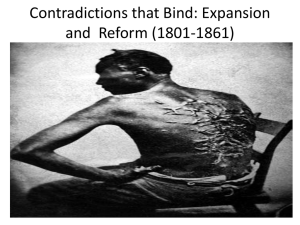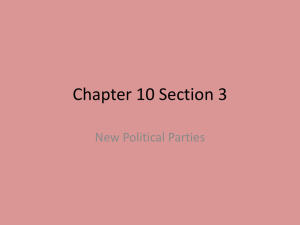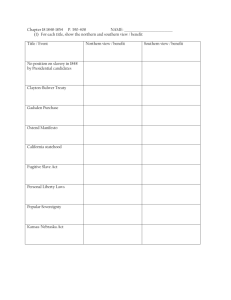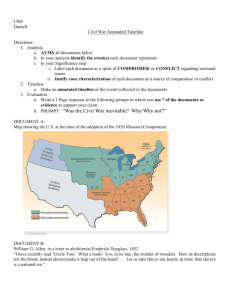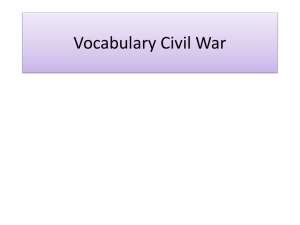Meseberg Taylor Meseberg MWF 8:00-9:05am 5-13
advertisement
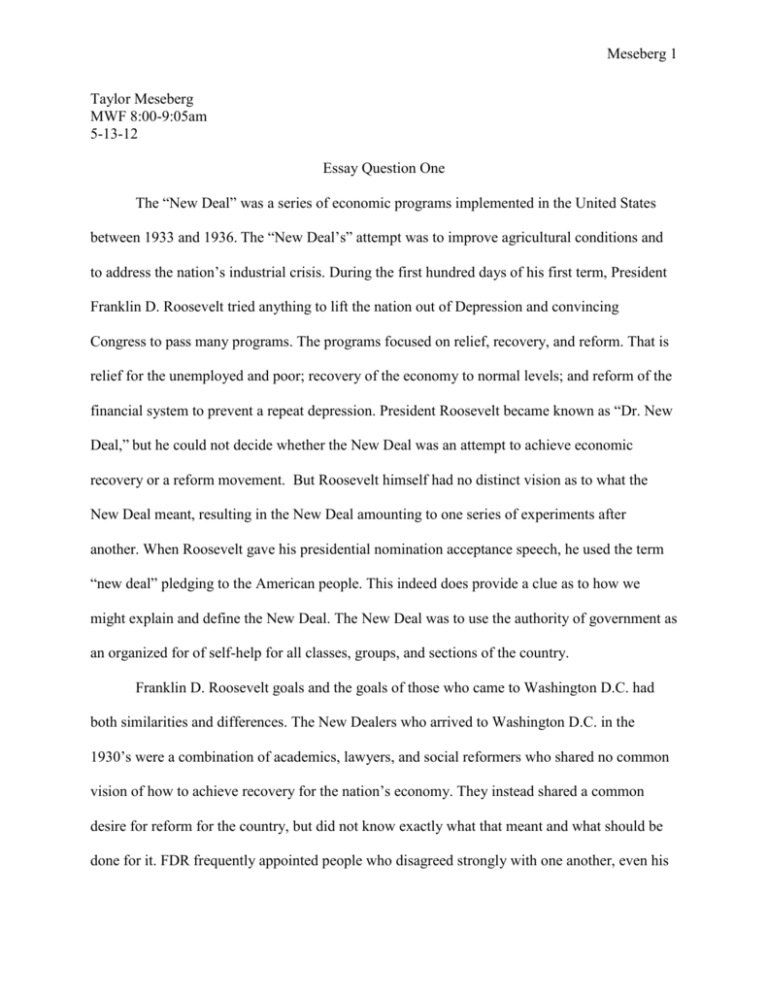
Meseberg 1 Taylor Meseberg MWF 8:00-9:05am 5-13-12 Essay Question One The “New Deal” was a series of economic programs implemented in the United States between 1933 and 1936. The “New Deal’s” attempt was to improve agricultural conditions and to address the nation’s industrial crisis. During the first hundred days of his first term, President Franklin D. Roosevelt tried anything to lift the nation out of Depression and convincing Congress to pass many programs. The programs focused on relief, recovery, and reform. That is relief for the unemployed and poor; recovery of the economy to normal levels; and reform of the financial system to prevent a repeat depression. President Roosevelt became known as “Dr. New Deal,” but he could not decide whether the New Deal was an attempt to achieve economic recovery or a reform movement. But Roosevelt himself had no distinct vision as to what the New Deal meant, resulting in the New Deal amounting to one series of experiments after another. When Roosevelt gave his presidential nomination acceptance speech, he used the term “new deal” pledging to the American people. This indeed does provide a clue as to how we might explain and define the New Deal. The New Deal was to use the authority of government as an organized for of self-help for all classes, groups, and sections of the country. Franklin D. Roosevelt goals and the goals of those who came to Washington D.C. had both similarities and differences. The New Dealers who arrived to Washington D.C. in the 1930’s were a combination of academics, lawyers, and social reformers who shared no common vision of how to achieve recovery for the nation’s economy. They instead shared a common desire for reform for the country, but did not know exactly what that meant and what should be done for it. FDR frequently appointed people who disagreed strongly with one another, even his Meseberg 2 political opponents, to do the same sorts of tasks. President Roosevelt hoped that something or anything would work. When President Roosevelt took office there were four types of groups that defined the American people: socialism, communism, fascism, and the New Deal. Because of this there were many political successes and failures of the Roosevelt administration during the 1930’s. A program that proved to be a failure with the American people was The Agricultural Adjustment Act (AAA). The AAA developed a system of paying farmers not to farm and of subsidizing food prices. The Supreme Court then marked the AAA as unconstitutional because it gave too much power to the Executive branch. The National Recovery Administration (NRA) attempted to create fairness asking for businesses to cooperate but also encouraged them to fix prices. But the NRA also proved to be unpopular. Associationalism, cooperation between businesses themselves and the government, was occurring amongst the American people. By 1937, Congress no longer supported any major New Deal initiatives and it was no longer a revolutionary reform movement. It was revolutionary for not what it solved but for what it introduced, the “Welfare State.” The Welfare State was political support of interest groups, businesses, and anyone who could all be balanced against opponents of New Deal reform. The New Deal worked politically by providing relief and entitlements to certain specified groups. It was a combination of competing and contradicting reform efforts loosely tied together by President Roosevelt. Ultimately, President Roosevelt was a successful politician because he made the American people happy and maintained popular even when the New Deal began to lose support. It is proven by the fact that he was the only American president to be elected more than two terms. Although the New Deal was successful and programs were developed that helped the American people and economy, it did not end The Great Depression. Meseberg 3 Essay Question Two The United States went to war against the Germans and the Japanese in 1941. On the other hand, many Americans were extremely reluctant to become involved in foreign wars. Americans worried about events in Europe, but after WWI many were unwilling to be drawn again to an international war. Not interventionist, also known as isolationist was very common amongst Americans, meaning the American People did not want to shed their own blood on someone else’s soil for no reason. So, President Roosevelt’s foreign policy was to keep the United States out of war and be neutral. The U.S. Congress passed the Neutrality Acts in 19351937 which symbolized a longing for peace. The Neutrality Acts prohibited the sale of weapons to anybody involved in the war. Members of the America First Committee were very anti-war and planned strategies for keeping the United States out of war. In the 1930’s FDR was more concerned about politics than international problems, so in terms of his foreign policy, FDR rarely led U.S. public opinion, he usually followed it, doing whatever would make the American people happy. However, in 1938-1939 FDR changed as did the U.S. public opinion after the Germans exploited Jews and was conquering one country after another. The American public worried about the German expansion and FDR called for U.S. Military build ups and coordinate a defense strategy with Britain. When the war began in Europe of September of 1939, Congress lifted the Neutrality Acts and permitted “cash-and-carry.” It allowed the sale of material to countries involved in the war as long as the recipients arranged for the transport and paid immediately in cash. Cash and carry still instilled a sense of neutrality between the United States and European countries while still giving aid to Britain. In 1940, Britain won an aerial battle against Germany, but soon after, Germany began terror bombing Britain in the famous invasion called “Blitz.” Britain’s suffering contributed significantly to changing American attitudes about Meseberg 4 the war. In 1941, Germany invaded the Soviet Union and that’s when U.S. involvement began to deepen. Congress replaced cash-and-carry with a policy of lend-lease, which extended virtually unlimited credit to nations fighting the Germans and Japanese. Once the United States began the lend-lease, the Germans realized the U.S. Neutrality Acts became a “dead letter.” German Uboats began sinking U.S. merchant ships in the Atlantic Ocean resulting in an undeclared naval war between the United States and Germany in the North Atlantic. Meanwhile, Japan was conquering countries moved from China, to South East Asia, to countries in the Pacific. As Japan moved through Asia, Americans froze Japanese assets in the United States and stopped trade with Japan. Japan feared it would be economically strangled by the U.S. embargo. Japanese military strategists believed that the best way to guarantee access to resources was by destroying the U.S. fleet at Pearl Harbor, December 7, 1941. The leader of the Imperial Japanese Navy predicted that if they could knock out the American navy in six month, then the Japanese would “run wild” in the Pacific. But, if Japan could not defeat the United States in six months, then Americas industrial might guarantee Japan’s defeat. The biggest mistake Japan made on the attack on Pearl Harbor was they did not destroy the aircraft carries or take over total control of the island. Hitler then declared war on the United States four days after the attack on Pearl Harbor because he believed Japan would move west and attack the Soviet Union, but the Japanese did not attack the Soviets. Although the United States fought a global war against the Axis powers, Germany and Japan did not coordinate any strategy. The axis was not much of an alliance. The motivations for the axis powers were quite different. Japan was the only industrialized nation in Asia and it was rich, but they had few natural resources. Japan believed that the only way to stay rich was to conquer natural resources from other Asian countries and the U.S. The main motivation for Meseberg 5 Japan was economics. For Germany on the other hand, Hitler’s motivation was race and space. He wanted to eliminate Germany’s Jews and conquest East Europe. Japan differed from Germany because the goal of Japan was to have as many resources as possible to stay and become richer. Hitler’s Germany goal was for as much power as possible and controlling as much territory as he can and eliminating any race he did not like creating space for the true Germans. Essay Question Three (Extra Credit) Dear President Zachary Taylor, As your advisor I am writing to you to tell you that you should veto the Compromise of 1850. Vetoing the Compromise will stop the expansion of slavery and put an end to it. If you do not veto this Compromise the outcome of it could be devastating to our country. Slavery could end up taking over the whole country and it will never be stopped. By vetoing the Compromise it will stand firm by your beliefs proving the fact of valuing the Union over states’ rights. Mr. President I advise you to veto the Compromise, it is for the better good of our country. There are many political issues that are at stake and could affect this country terribly. If the Compromise is passed this what will happen: California will become a free state, the organization of territories acquired from Mexico according to the principle of “popular sovereignty,” the end of slave trade, but not the abolition of slavery itself in Washington D.C., and it will strengthen the Fugitive Slave Act which requires Northern States to return escaped slaves regardless of the laws in the specific states. The leader behind the Compromise of 1850 is our political rival Henry Clay, a member of our own Whig Party. We should view him as a serious political threat, he is trying to undermine your presidency. Clay has become to realize though that he cannot pass these series of bills Meseberg 6 without some help. A Democratic senator of Illinois named Stephen A. Douglas is now helping him. So far Douglas has promoted a doctrine called “Popular Sovereignty” which is argues that the voice of the American people should matter more at the local level than decisions made at the national level. Because of his doctrine Compromise supporters now put aside the Wilmot Proviso and are now in favor of popular sovereignty fearing that Southerners might leave from the Union. We do have politicians on our side and are also in favor of opposing the Compromise. Senator William Henry Seward of New York is opposing the Compromise because of the expansion of slavery and he also opposes slavery itself. Seward believes that slavery is morally wrong and argues that “there is a higher law than the Constitution.” Senator Seward is very much against the Compromise because of its leniency towards slavery. Another politician who opposes the Compromise is a Democrat out of South Carolina named John C. Calhoun. He is very angered by the Compromise and opposes it because he rejects any limitation on the expansion of slavery. But there is one thing about Calhoun, Mr. President, he has regarded you as a traitor to the cause because you thought the Union is more important than slavery. Calhoun now symbolizes the Southern “fire eaters,” who regarded any opposition to slavery as morally wrong. Mr. President your highest priority right now is to create a balance between the northerners and the southerners. Currently northerners are supporting you because you are a war hero and because there isn’t any slavery in their states. Southerners have supported you because you are a slave owner but since you believed that slavery should not be allowed to expand into the lands seized from Mexico, they have come to go against you. Since your threat to stop the expansion of slavery, many southerners have been talking of secession. I know that you have hinted towards vetoing the Compromise because you oppose the expansion of slavery and you Meseberg 7 view the Compromise as too supportive of slavery. I believe that vetoing the Compromise is absolutely the right decision and opposing it for the reasons you described stand correct and are four the best interest of our country. Vetoing this Compromise is definitely the right thing to do Mr. President, it will stop the expansion of slavery and I believe it will eventually do as you hope, and die out, ending slavery as a whole.



